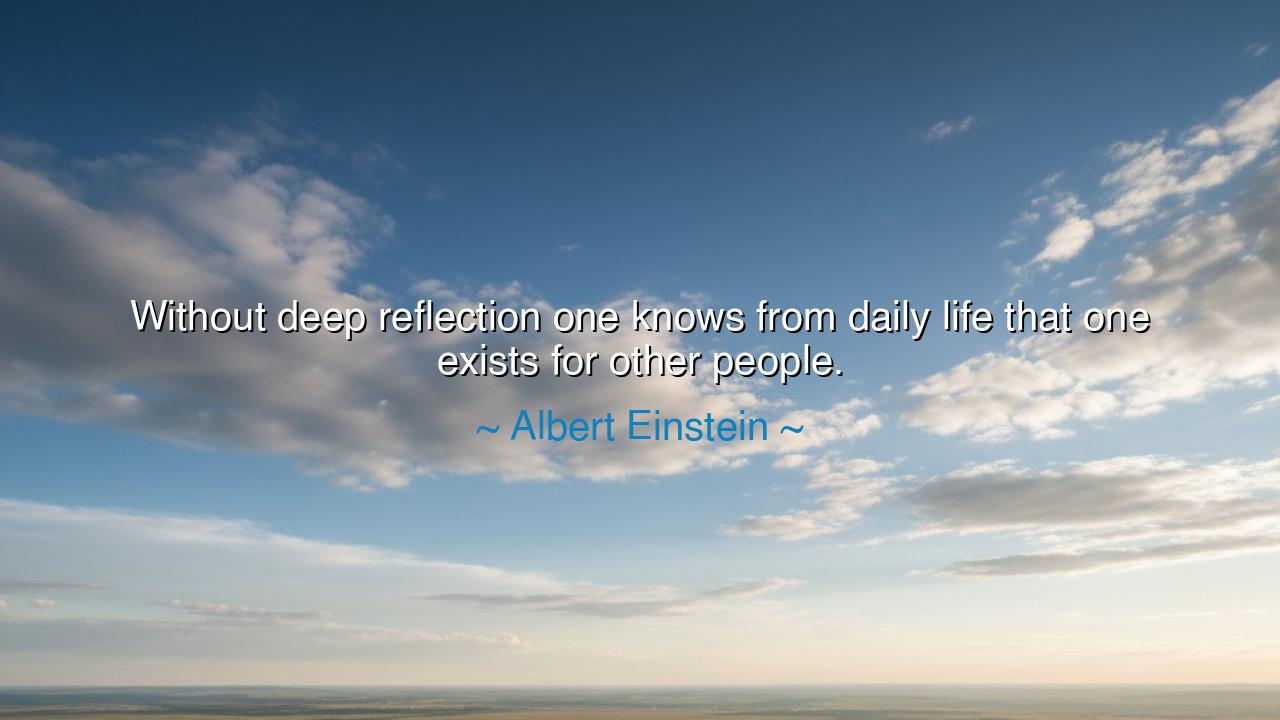
Without deep reflection one knows from daily life that one exists






Hear the words of Albert Einstein, who gazed into the mysteries of the cosmos and yet understood the heart of humanity: “Without deep reflection one knows from daily life that one exists for other people.” These words are both gentle and mighty, reminding us that the truth of human existence is not found in endless speculation, nor in isolated thought, but in the simple rhythm of everyday living. For in the gestures of family, in the bonds of friendship, in the responsibilities of community, one sees clearly: we are not born for ourselves alone, but for others.
The ancients spoke this wisdom long before the age of science. The Stoics proclaimed that man is a limb of the greater body of humanity, and that to live only for oneself is to sever the limb from the whole. Confucius taught that harmony is the root of all virtue, and harmony exists only when each person lives with respect and care for the other. Einstein, though famed for unraveling the laws of physics, echoes their eternal truth: one need not be a philosopher to know this. It is written into the very fabric of life.
Consider the mother who rises in the night to comfort her child. She does not ask for reward, nor does she reflect upon whether her life exists for others. Her action itself is proof, living testimony that she exists for another’s well-being. Or consider the soldier who stands watch in the cold, not for himself, but for those who sleep behind the walls. In such acts, both humble and heroic, Einstein saw the evidence of a truth greater than any theory: life is interwoven, and to live is to serve.
History offers us radiant examples of this teaching. Think of Mahatma Gandhi, who clothed in simplicity, gave his voice, his body, his very life for the liberation of his people. He did not need long reflection to know his purpose; his daily struggle revealed it. Or think of Florence Nightingale, who spent her nights tending the sick and wounded, driven by the conviction that her existence was bound to the healing of others. These lives stand as monuments to Einstein’s wisdom: that the highest fulfillment of being is found in living for other people.
The meaning of this truth is both profound and practical. It is profound because it reminds us that the essence of humanity is connection—not isolation, not selfish gain. It is practical because it gives direction to our daily choices: every act of kindness, every word of encouragement, every sacrifice made for another, transforms existence from mere survival into a life of meaning. Without this, even the most brilliant achievements turn hollow. With it, even the smallest acts shine with eternal light.
Yet there is also a warning hidden in these words: to live as though one exists only for oneself is to live falsely. The pursuit of wealth, fame, or pleasure without thought for others leaves the heart barren. But to recognize, even without reflection, that one belongs to the greater web of humanity is to walk in truth. For in giving to others, we find ourselves; in respecting others, we earn respect; in serving others, we taste the fullness of life.
What then shall we do? Begin each day with the knowledge that you are here not for yourself alone. Ask: whose burden can I lighten today? Whose spirit can I lift? Whose hunger can I ease, whose sorrow can I soften? In these daily acts, you fulfill the essence of your existence. And as you give, you will find that others too will stand by you, and the circle of humanity will grow stronger.
Therefore, O listener, engrave this wisdom upon your soul: “One exists for other people.” It is not an abstract theory, but the heartbeat of life itself. Live by it, and your days will be rich with meaning. Teach it, and generations will rise knowing the true law of existence. For in living for others, you do not lose yourself—you find the highest, most radiant form of yourself.






AAdministratorAdministrator
Welcome, honored guests. Please leave a comment, we will respond soon